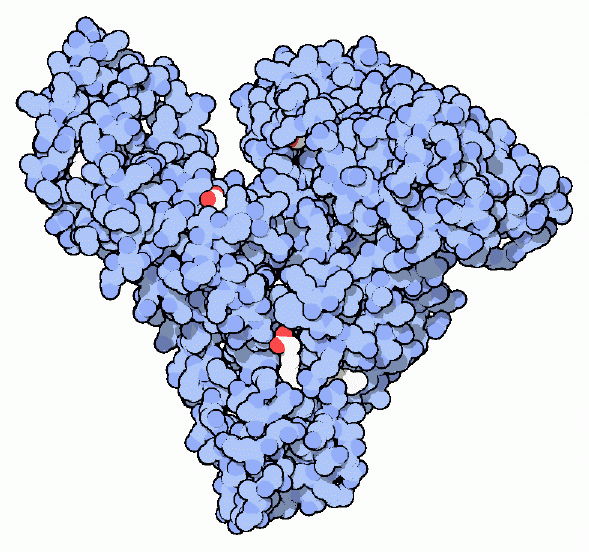|
Inhaltsübersicht | Nanomaschinen | Moleküle | Programme | Kurse | Fun | Links |
||
| > |
Serum Albumin

Think about how convenient it is to be able to eat. Each one of your ten trillion cells requires a constant supply of nourishment. But we don't have to worry about this--we merely eat our dinner and our body does the rest. The food is digested and the useful pieces are delivered to cells throughout the body, using the bloodstream as the delivery system. Delivery of water-soluble molecules, like sugar, is easy. They float in the watery bloodstream and are picked up by cells along the way. Other important nutrients, however, are not soluble in water, so special carriers must be made to chaperone them to hungry cells.
Carrying Fatty Acids
Serum albumin, shown here from PDB entry 1e7i, is the carrier of fatty acids in the blood. Fatty acids are essential for two major things in your body. They are the building blocks for lipids, which form all of the membranes around and inside cells. They are also rich sources of energy, and may be broken down inside cells to form ATP. Thus, your body maintains a storehouse of fatty acids, stored as fat. When your body needs energy or needs building materials, fat cells release fatty acids into the blood. There, they are picked up by serum albumin and delivered to distant parts of the body.A Versatile Protein
Serum albumin is the most plentiful protein in blood plasma. Each protein molecule can carry seven fatty acid molecules. They bind in deep crevices in the protein, burying their carbon-rich tails safely away from the surrounding water. Serum albumin also binds to many other water-insoluble molecules. In particular, serum albumin binds to many drug molecules, such as ibuprofin, and can strongly affect the way they are delivered through the body.A Generic Protein
Since serum albumin is so common in the blood and so easy to purify, it was one of the first proteins to be studied by scientists. Today, the similar protein from cows--bovine serum albumin or BSA--is widely used in research when a generic protein is needed. Many enzymes are unstable when they are placed in a dilute solution, so it is difficult to study them in the laboratory. One solution is to add some BSA. It stabilizes the enzyme during the experiment, but it is relatively neutral so it doesn't affect the properties of the enzyme.Next: A Collection of Carriers
Last changed by: A.Honegger,